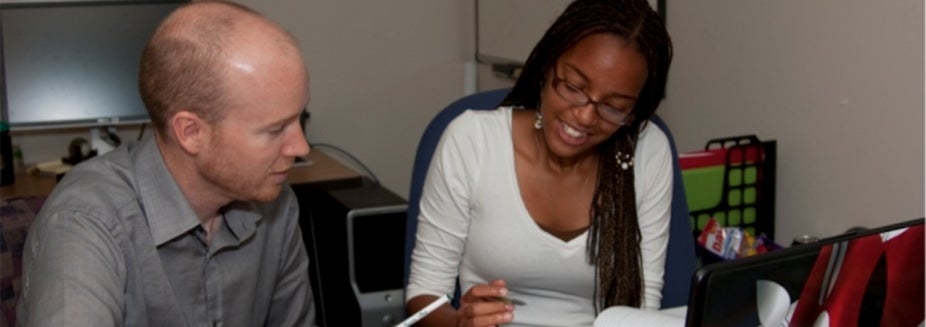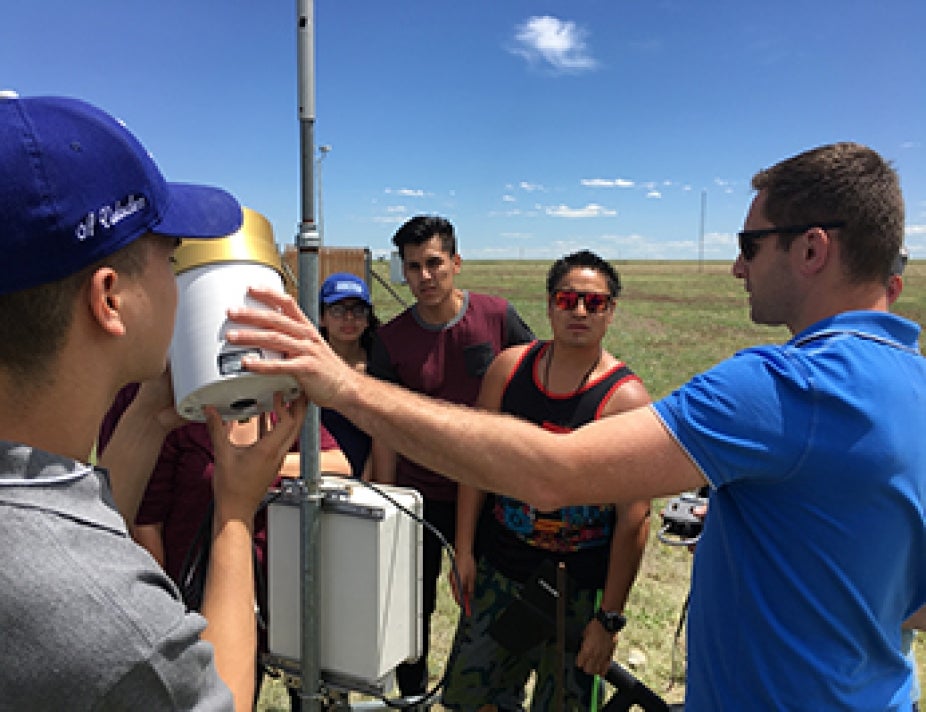Preparing Mentors

Index of Topics

Mentors are the heart of an REU! They:
- Guide students in their work & career
- Build student confidence and comfort
- Introduce students to colleagues
- Model ethical and professional behavior
- Demonstrate collaboration
- Provide insight into life as a scientist
- Give supportive career guidance
- Increase student sense of belonging
-
HOLD A MEETING FOR MENTORS
-
SHARE THE BENEFITS FOR STUDENTS AND FACULTY
-
PROVIDE MENTORS WITH BASIC INFORMATION ON YOUR REU PROGRAM
-
TIPS ON MENTORING FOR A PRODUCTIVE SUMMER
-
PLAN TO ENGAGE AND SUPPORT MENTORS
-
SHARE RESOURCES WITH YOUR MENTORS
-
SUPPORTING TRANSGENDER STUDENTS
-
MATERIALS FOR THE REU SITE MANAGER
One of the key factors that REU students cite as impacting the success of their summer is their relationship with their science mentor. Setting your mentors up to succeed will help both parties. What follows are some suggestions.
For questions or feedback, contact V. Sloan.
HOLD A MEETING FOR MENTORS
Prepare your mentors
- Most REUs hold a meeting for their mentors before the program starts; it helps the summer go more smoothly.
- Share this handout on "Tips for Science Mentors"
BENEFITS FOR STUDENTS AND FACULTY OF MENTORING
Give evidence from the research
- Faculty members or scientists who are mentors:
- Can have research stimulated by having student focus on a dusty project & ask insightful questions
- Add new energy to a research group and identify potential graduate students
- Can give grad students and postdocs a chance learn how to mentor a student
- Satisfy the broader impact criteria of grants or institution
- Help students prepare for the workforce or grad school (see "What do employers seek in graduates? Internships" graph)
- Students who have mentoring relationships are found to be:
- More productive in research activity & publishing
- More efficient getting through graduate school
- Develop bigger networks
- Happier in their field
- More successful in finding career placements
PROVIDE MENTORS WITH BASIC INFORMATION ON YOUR REU PROGRAM
Overall goal, end deliverables, deadlines, expectations of both mentors and students
- List of the student's deliverables
- The mentors need to know what the student is expected to produce and when it is due, such as:
- poster presentation (individual or group)
- an oral presentation with slides
- The mentors need to know what the student is expected to produce and when it is due, such as:
- Calendar
- Guide the mentor on what to expect during the REU program. List dates that might impact the mentor, such as:
- Student arrival and departure dates
- Orientation and cohort-building activities, such as a welcome meal or planned field trips
- Workshops or seminars (e.g. on résumé-writing or graduate school)
- Due dates for assignments, including practice talks or poster sessions
- Presentations such as a final poster session or colloquium
- Mid-program meeting with mentor, student, and REU lead (date could be TBD)
- See this sample calendar for mentors (PDF)
- Tip for the REU site manager: It is recommended to create a weekly schedule for your students. For example, have a regular biweekly Friday workshop on elevator speeches, posters, writing abstracts, creating a scientific talk, ethics, practice talks, and more. This can really help to create a sense of cohort, and helps you to stay connected to what is going on with the students.
- Guide the mentor on what to expect during the REU program. List dates that might impact the mentor, such as:
- Logistics and Expectations
- Mentor's involvement in coaching the student on their project
- Remote? Mentor's responsibility to check in with their student regularly, even if briefly.
- On-site? Mentor's duties at functions such as attending a poster session and dates, first day at work, workspace needs like computer, telephone. What is expected of the student in terms of work hours (what kind of flexibility is the mentor okay with on timing)
- Describe pay set-up for students
- Expectations of students' professional behavior related to communication, dress code, workplace conduct, & drug-free work place
- Provide students and mentors with a rubric or goals to discuss at the outset (goals, objectives) and mid-program (progress)
TIPS ON MENTORING FOR A PRODUCTIVE SUMMER
Advice for success & problem solving, slides for preparing mentors
- How do I start?
- Get to know your mentee
- Find out what is important to them and interesting to them
- Really listen to them
- Discuss projects and see what clicks
- Share about your career joys, challenges, and pathway
- Build trust by listening, being respectful, using humor, and leading by example
- Set expectations
- What expectations does the mentor have for the student? What type of assistance does the mentee want from the mentor?
- Talk about communication:
- plan regular meetings (discuss how often, when, where, and how long will you meet?)
- discuss work hours (what is expected?)
- work conditions; does the student have adequate access to space, quiet?
- Discuss expectations of professional behavior and lead by example
- Making expectations clear reduces misunderstandings and when problems arise, refer back to these conversations
- Project design and milestones
- Scope the project scale accordingly (it's a summer project, not a thesis or a dissertation)
- Have the student make a work plan and discuss it with their mentor (work plan template)
- A two-minute elevator speech describing their project (after e.g. 1-2 weeks - yes, that early)
- A five-minute white-board talk on their project with no slides (after e.g. 3 weeks)
- A practice talk with slides (after e.g. 4-6 weeks) with you
- A practice talk with their mentor before their final presentation
- A rough template of their scientific poster with placeholders for images and drafted captions and text sections (after e.g. 4 weeks)
- Communicate regularly with your student
- Touch base frequently (silence is usually not a good sign)
- 6 steps for a productive summer (by IRIS)
- Use the "coaching roadmap" and supporting questions
- Watch for signs of stress in the student
- A guide to problem solving
- Lead by example
- Be a rounded mentor
- Talk about your own career path and decisions that you made along the way
- What is most exciting about science to you?
- Share your joys and challenges of working in this career
- Discuss how to keep a work-life balance: how does being productive during work hours allow for real time off?
- Talk about career opportunities outside of academia, as most students need to know what is out there and that there are options
- Consider hosting a non-academic career panel to introduce your students to the private sector, government, and education
- Introduce your mentee to your colleagues and conferences in your field
- Conversations with your mentee on career choices or the student's challenges should be private
- Again, lead by example
PLAN TO ENGAGE WITH AND SUPPORT YOUR REU MENTORS
Emails, meeting with student & mentors, brown-bags for mentors
- Send a weekly/biweekly email to mentors updating them on programmatic events and INCLUDE a few photos
- Meet with the student and mentor(s) 3-4 weeks into the program and ask the student to present an update at a white board. This can be very helpful for seeing if things are on track
- Organize a brown-bag lunch for mentors where they can share challenges and get support, around mid-program
- Check in with each mentor individually a few times during the REU program
SHARE RESOURCES WITH YOUR MENTORS
Links to mentoring manuals, tips, video, articles
- Tips for science mentors (modified from the SOARS program at UCAR)
- Article on: How to Mentor REU Students (by students, in the Council on Undergraduate Research)
- Article on: The Qualities and Impacts of a Great Mentor (from ESA Bulletin 2013)
- Mentoring self assessment (from ESA Bulletin 2013)
- Mentoring manual for (1) faculty and (2) Grad students & Post Docs (by the IBP)
- Insights from the REU community (PDF) (REU Workshop 2014)
- Preparing and supporting mentors (presentation at the 2014 REU Workshop video, 19:00 min)
- Sample calendar for mentors (PDF)
- Mentoring agreement - for mentors to read & sign (example from IRIS program, PDF)
SUPPORTING TRANSGENDER STUDENTS
Tips on supporting and insight into campus life for a transgender student
- Tips for supporting transgender students: this web page has several pointers with explanations of what to say or not to say in being an ally to transgender people. When you become an ally of transgender people, your actions will help change the culture, making society a better, safer place for transgender people - and for all people (trans or not) who do not conform to gender expectations.
- Article on transgender issues on college campuses: this article covers different aspects of supporting transgender students into your program, and addresses some of the logistical pieces such as housing, bathrooms, name on transcripts, and helping students feel included.
MATERIALS FOR THE REU SITE MANAGER
Articles, mentoring agreement, and more
- Slides to use for preparing mentors (PPT slides)
- Read the articles listed above for the mentors
- Mentoring agreement - for mentors to read & sign (example from IRIS program, PDF)
- Rubric for assessing student progress on skills - for both students & mentors to fill out and discuss, mid-program (example from IRIS program, PDF)
- Student feedback survey on mentors (from Lab. for Atmos. Research REU at Washington State U., .DOC)
- See also the Program Evaluation page on the GEO REU webpage
- Read over the "Tips for Science Mentors" handout (modified from the SOARS program at UCAR)
- Check out the skills suggested in this example of an Individual Development Plan for graduate students at Scripps at UCD